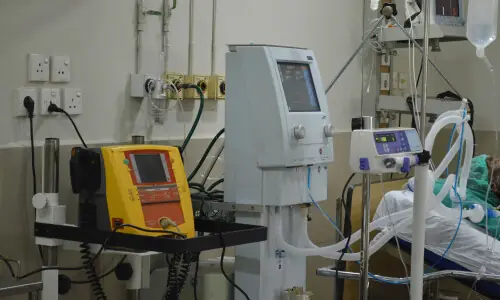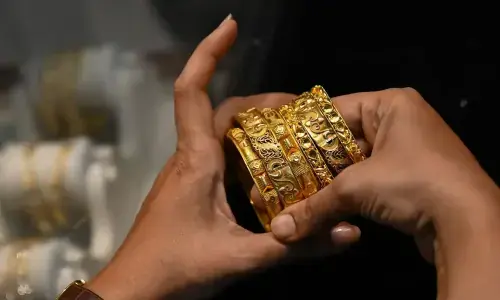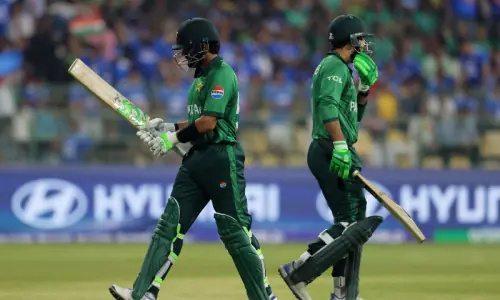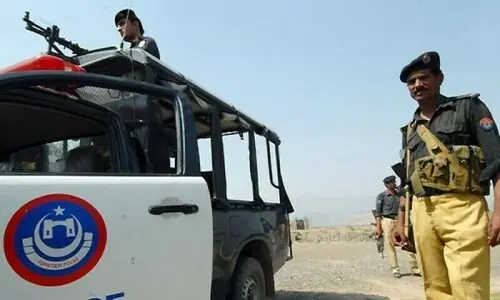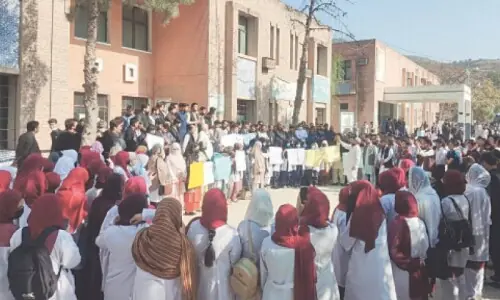
ISLAMABAD: The ‘solar kids’ who are being treated for an illness which leaves them paralysed by sunset each day might be suffering from a neuro transmitter deficiency, said vice chancellor of the Pakistan Institute of Medical Sciences (Pims) Dr Javed Akram, who also chaired a meeting of a medical board called to discuss the children’s case.
“In simple words, neuro transmitters in the brain have been disturbed. A similar case was reported in Japan and was named JPA, but that disease occurs in both male and female children. However, our experiences in Pakistan indicate that this case only occurs in male children and we are considering giving the disease a new name,” he added.
The vice chancellor said doctors have decided to research into the illness and to find the reason for its occurrence which will require a detailed analysis of DNA. He said health organisations have been trying to contact the hospital to find out more about the illness.
“Because it is a unique case, it has been decided to launch a website and upload details of the case and the course of treatment to it. Johns Hopkins University in the USA and the National Hospital for Nervous Diseases in the UK have been contacted and asked to collaborate in diagnosing the children. A popular medical journal by the name of Lancet has also expressed concern in publishing a study of the case,” the VC said.
Brothers are improving with current treatment
Dr Akram said that samples for five DNA analysis tests will be sent to the UK and USA in order to seek a second opinion and to help in diagnosing the case.
The case of the three brothers came to light late last month when reports emerged of them waking up normal and active every day and then losing energy as the day progressed with them being paralysed by sunset. Because they are only active during the day, the children were nicknamed ‘solar kids’ by the villagers.
Doctors had initially thought the children were suffering from congenital Masthenia Syndrome, or MS for short, which is a rare disease with only 600 cases reported worldwide till date. The nerves of people suffering from MS are so weak that they are fatigued within a few hours of waking up.
While the youngest of the brothers who has just started showing symptoms is at home with his mother, the two older boys were first moved to a satellite lab of the Pakistan Institute of Medical Sciences (Pims) in Lahore from where they were moved to Pims in Islamabad and a suite in a private ward was reserved for them.
A team had been dispatched to their village in Balochistan in order to collect samples of blood from members of the children’s family and also of their one-year-old brother, who has started showing symptoms and is in the village with his mother, Dr Akram said.
State Minister for Capital Administration and Development Division (CADD) Dr Tariq Fazal Chaudhry paid the children a visit to the hospital on May 4 and announced that the government will be paying for the children’s treatment expenses, even if it was decided they were to be treated abroad.
The children’s father, Mohammad Hashim, who is a resident of Quetta and works as a security guard at the University of Information Technology Balochistan, is relieved that his children are now being treated and are showing improvement.
Before they were given medical attention, Hashim had taken his children to spiritual healers in order to treat them as he knew there was something “extraordinarily” wrong with them.
“I have six children, two daughters and four sons. Of them, three are suffering from a disease that no one understands, because of which many say that they are victims of black magic. I took them to nearby clinics at first where the doctors could also not understand what was wrong with my children. That was when I started visiting spiritual healers,” Hashim told Dawn.
“I was helpless and disappointed because it was not possible for me to find and afford treatment for my children. My two elder sons are completely affected by the disease and my youngest son Ilyas, who is only a year old, just started showing symptoms. I had started believing that God had only given me three children, two daughters and a son,” the children’s father said.
“I enrolled both my sons in a seminary because I believed that religious education might heal their disease, and those who study at a seminary go on to become something in the future,” he added.
Mr Hashim said that after his children were moved to Islamabad to be treated, he had started hoping that they will become better.
“After conducting tests, doctors have now started giving my children medicines because of which they remain active till 10pm when they used to be paralysed by sunset before. They have improved so much that I believe they will fully recover if treatment continues”, he said.
“I told my wife that they have started with treatment and that the boys are showing an improvement and that made her so happy”, Mr Hashim added.
The boys seemed happy in their private suite at the hospital. The elder of the two children admitted at Pims, Mohammad Shoaib who is 13 years old, said he had never seen a private suite with so many facilities and machines and was also happy with the food they received every day and the attention from doctors and the media.
Talking to Dawn, Shoaib said he studies at a seminary and wants to become a cleric.
“I am happy here and when I go back, I will continue with my studies,” he said.
His younger brother, Abdul Rasheed, who is nine years old, said he can read the alphabet in Urdu and Arabic and wants to memorise the Holy Quran.
Meanwhile, renowned molecular biologist Prof Dr Riazuddin said that the gene for the disease runs in the family of the children.
“Every human has between 26,000 and 30,000 genes or paragraphs on chromosomes which defines what sort of diseases they will be affected by in the future. A missing gene can become the reason for a disease as well and a detailed DNA analysis is required to know the exact situation and condition,” he explained.
“The parents of these children are cousins and it seems that the gene runs in the family. Three of their children are affected by the disease and the remaining three are not,” he added.
A doctor at the hospital, who is part of the team treating the children, said he does not think the boys will fully recover from the disease.
“The only option is for the family to be screened and they should be told not to have other children without prenatal tests to confirm that the child does not have the disease,” he said.
Published in Dawn, May 9th, 2016


